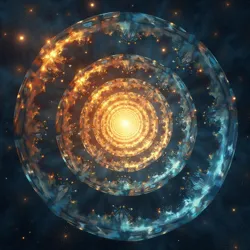Chronostatic Eudaimonia: Flourishing in the Block Universe

Depicted is the concept of chronostatic eudaimonia representing flourishing within the block universe theory where all time exists simultaneously.
Chronostatic Eudaimonia
Block Universe theory
All moments in time are equally real
Time is not a flowing river
Flourishing in a static spacetime
In the realm of philosophical thought and personal introspection, the concept of Chronostatic Eudaimonia emerges as a framework for understanding and achieving a fulfilling life within a specific model of reality known as the block universe, sometimes referred to as the static spacetime or eternalist perspective. This viewpoint posits that all moments in time—past, present, and future—exist simultaneously and are equally real, forming a singular, unchanging four-dimensional continuum. Within such a universe, the conventional understanding of time as a flowing river, with a distinct past, present, and future, is fundamentally challenged, and with it, many traditional notions of agency, purpose, and the pursuit of a "good life." Chronostatic eudaimonia, therefore, seeks to address these challenges, offering a path to flourishing that is both informed by and reconciled with the principles of a block universe.
Introduction
The Nature of the Chronostatic World
The foundation of chronostatic eudaimonia lies in the acceptance of the block universe model. This model, gaining traction within certain interpretations of physics, particularly within the framework of Einstein's theory of relativity, suggests that time is not a dynamic progression but rather a dimension, akin to spatial dimensions, in which all events are permanently situated. Imagine a loaf of bread, where each slice represents a moment in time. The entire loaf, from the first slice to the last, exists simultaneously; no slice is inherently "more real" or "more present" than any other. Similarly, in a block universe, the entirety of spacetime, encompassing all events from the beginning to the end, is considered to be equally existent.
This perspective stands in contrast to the more intuitive and commonly held view of presentism, which asserts that only the present moment is real, with the past being gone and the future yet to come. Presentism aligns with our everyday experience of time as something that flows and changes, with us moving through it. However, the block universe challenges this intuition by suggesting that our perception of time's passage is an illusion, a product of our consciousness navigating this static four-dimensional reality.
Within this chronostatic framework, concepts such as cause and effect, change, and even free will take on nuanced meanings. If all events are already "written" into the fabric of spacetime, then the idea of actively shaping the future through our choices becomes problematic, or at least requires re-evaluation. This is not to say that the block universe necessarily implies fatalism, but rather that it necessitates a shift in how we understand agency and our role in the unfolding of events.
The Challenge to Traditional Values
The implications of the block universe for the pursuit of a fulfilling life are profound. Many traditional frameworks for eudaimonia, or human flourishing, are predicated on assumptions about time and agency that are called into question by chronostasis. For instance, the idea of striving towards future goals, of making choices that will shape our destiny, or of learning from past mistakes, all seem to hinge on a notion of time as dynamic and open-ended.
If the future is already determined, if our lives are, in a sense, already complete and unchanging blocks within spacetime, then what is the point of striving? What meaning can be found in actions that are, in a sense, pre-ordained? These are the existential questions that arise from a chronostatic worldview, and it is these questions that chronostatic eudaimonia seeks to address. It is not about rejecting the possibility of a fulfilling life within a block universe, but rather about re-orienting our understanding of what constitutes such a life and how it can be achieved.
Moreover, the block universe can challenge our understanding of personal identity and responsibility. If all moments of our lives are equally real, does this diminish the significance of the present moment? Does it lessen the weight of our decisions if they are already part of a fixed, unalterable past? These are complex issues that require careful consideration, and chronostatic eudaimonia aims to provide a framework for navigating these challenges and finding a path towards a meaningful and flourishing existence within the unique context of a block universe.
Reconciling Determinism and Agency
The Illusion of Choice?
 Depicted is the balance between determinism in a block universe and human agency showing how choices can still be meaningful even in a predetermined reality.
Depicted is the balance between determinism in a block universe and human agency showing how choices can still be meaningful even in a predetermined reality.One of the most immediate and perhaps unsettling implications of the block universe is the apparent challenge it poses to the concept of free will. If the future is already fixed, if every event is predetermined within the spacetime block, then it might seem that our choices are merely illusions, predetermined outcomes playing out in a pre-scripted drama. This deterministic interpretation can lead to feelings of fatalism and a sense of meaninglessness, undermining the very foundations of agency that are often considered essential for a fulfilling life.
However, it is crucial to recognize that the block universe model, while suggesting determinism at a fundamental level, does not necessarily negate the subjective experience of choice or the significance of our actions. Even within a deterministic system, there can be meaningful distinctions between different courses of action, and our internal deliberations and decisions can still play a crucial role in shaping our subjective experience of life.
Consider the analogy of a river delta. The overall flow of water from the source to the sea is predetermined by gravity and the landscape. However, within the delta, there are countless branching channels, each representing a different path the water might take. While the ultimate destination is fixed, the specific route taken through the delta is influenced by local conditions, obstacles, and the intricate interplay of forces within the system.
Similarly, in a block universe, while the overall trajectory of our lives might be considered predetermined in a grand, spacetime sense, our moment-to-moment experiences and choices can still have a significant impact on the texture and quality of our journey through life. The feeling of making choices, of deliberating between options, and of experiencing the consequences of our actions, remains a real and vital part of our subjective experience, even if these choices are, in a deeper sense, already "part of the block."
Redefining Agency within Chronostasis
To reconcile the apparent determinism of the block universe with the desire for agency and a meaningful life, chronostatic eudaimonia proposes a redefinition of agency itself. Instead of focusing on libertarian free will—the idea that we have absolute, uncaused freedom to choose otherwise at any moment—it shifts towards a concept of narrative agency.
Narrative agency emphasizes our capacity to shape the meaning and interpretation of our experiences, even within a predetermined framework. While we may not be able to alter the fundamental events of our lives in a block universe, we retain the power to construct the narratives through which we understand and engage with these events. We can choose how we frame our past, how we interpret our present, and what aspirations we cultivate for our future, even if that future is, in some sense, already "written."
This focus on narrative agency aligns with the idea that human experience is fundamentally narrative in nature. We understand ourselves and the world through stories, through the weaving together of events into coherent and meaningful wholes. Even in a block universe, the power to shape these narratives remains a potent form of agency, allowing us to create a sense of purpose, meaning, and direction in our lives.
Furthermore, chronostatic eudaimonia recognizes the importance of internal freedom. While external circumstances may be predetermined, our internal responses, our attitudes, and our inner lives are not entirely fixed. We can cultivate virtues such as resilience, compassion, and wisdom, and these internal qualities can significantly shape our experience of life, even within a deterministic context. As the Stoic philosopher Epictetus famously said, "It is not events that disturb people, but rather their judgments about events." This emphasis on internal freedom and the power of interpretation becomes central to flourishing within a block universe.
Cultivating Meaning and Purpose
Embracing the Present Moment
 Depicted is the process of finding meaning and purpose within chronostatic eudaimonia emphasizing present moment awareness and relationships.
Depicted is the process of finding meaning and purpose within chronostatic eudaimonia emphasizing present moment awareness and relationships.Within the framework of chronostatic eudaimonia, the present moment takes on a heightened significance. If all moments are equally real and co-existent, then the present is not merely a fleeting transition between past and future, but rather a focal point where all of spacetime converges. It is in the present moment that we experience life most directly, where we engage with the world, and where we cultivate our inner lives.
Embracing the present moment, therefore, becomes a crucial practice for flourishing in a block universe. This involves cultivating mindfulness, attentiveness, and a deep appreciation for the richness and complexity of immediate experience. Instead of constantly chasing future goals or dwelling on past regrets, chronostatic eudaimonia encourages a shift in focus towards the here and now, towards savoring the sensory details of life, the beauty of the natural world, the warmth of human connection, and the simple joys of existence.
This emphasis on the present moment resonates with various philosophical and spiritual traditions, including Zen Buddhism and Stoicism, which also emphasize the importance of living in accordance with nature and accepting what is beyond our control. In a block universe, where the future is already determined, the present moment becomes the primary locus of agency and meaning. It is in the present that we can exercise our narrative agency, shape our internal responses, and cultivate a sense of purpose and fulfillment.
The Significance of Relationships
Human relationships are another vital source of meaning and purpose within chronostatic eudaimonia. Even if our interactions are, in a sense, predetermined within the spacetime block, the experience of connection, love, compassion, and shared experience remains profoundly valuable. Relationships provide us with a sense of belonging, support, and mutual understanding, enriching our lives in ways that transcend the limitations of a deterministic framework.
In a block universe, relationships can be seen as intricate tapestries woven into the fabric of spacetime. Each interaction, each shared moment, contributes to the richness and complexity of this tapestry. The bonds we form with others, the love we give and receive, the mutual growth and learning that occurs in relationships—these are all intrinsic goods that enhance our lives regardless of whether they are predetermined or not.
Chronostatic eudaimonia emphasizes the importance of cultivating meaningful and authentic relationships. This involves practicing empathy, kindness, and generosity, and fostering connections based on mutual respect and understanding. Even in a deterministic world, the quality of our relationships remains a significant factor in our overall well-being and flourishing. The depth of human connection, the shared joys and sorrows, the mutual support and encouragement—these are all sources of meaning that are not diminished by the concept of a block universe.
The Pursuit of Excellence
The pursuit of excellence, in various domains of life, also offers a path to purpose and fulfillment within chronostatic eudaimonia. Whether it is in art, science, craft, or any other field of endeavor, the striving for mastery, the dedication to honing skills and developing talents, provides a sense of direction and accomplishment that is intrinsically rewarding.
In a block universe, the pursuit of excellence can be seen as an unfolding of potential that is inherent within the spacetime block. The journey of learning, growing, and striving to achieve mastery is itself a valuable and meaningful process, regardless of whether the ultimate outcome is predetermined. The dedication, discipline, and effort involved in pursuing excellence cultivate virtues such as perseverance, focus, and resilience, which contribute to overall flourishing.
Chronostatic eudaimonia encourages individuals to identify their passions and talents and to dedicate themselves to their development. This might involve pursuing creative endeavors, engaging in intellectual pursuits, contributing to their communities, or striving for personal growth and self-improvement. The act of striving, of pushing oneself to reach one's potential, provides a sense of purpose and direction that is not negated by the concept of a block universe. As the fictional philosopher Lysander Brygos wrote in his treatise The Immutable Tapestry:
"Though the threads of our lives are pre-woven into the grand tapestry of spacetime, it is in the artistry of our embroidery, in the skill and care with which we execute our stitches, that we find our meaning. The pattern may be set, but the beauty of the work is ours to create."
Navigating Existential Concerns
Confronting Fatalism
One of the primary existential challenges posed by the block universe is the potential for fatalism. If everything is predetermined, if our choices are not truly our own, then it might seem that our actions are ultimately meaningless and that there is no point in striving for anything. This fatalistic outlook can lead to apathy, despair, and a sense of alienation from life.
However, chronostatic eudaimonia argues against succumbing to fatalism. While acknowledging the deterministic nature of the block universe, it emphasizes that meaning and purpose are not contingent upon libertarian free will or the ability to alter the fundamental course of events. Instead, meaning is found in the subjective experience of life, in the cultivation of virtues, in the pursuit of excellence, and in the quality of our relationships.
Even in a deterministic world, our actions still have consequences, both for ourselves and for others. While these consequences may be predetermined in a larger sense, they are nonetheless real and impactful within our subjective experience. Our choices shape the texture of our lives, influence our inner states, and contribute to the overall unfolding of events within the spacetime block.
Chronostatic eudaimonia encourages a shift in perspective from fatalism to constructive determinism. This involves accepting the deterministic nature of reality while actively engaging in life, making choices, pursuing goals, and striving to create a meaningful and fulfilling existence. It is about recognizing that even within constraints, there is still room for agency, purpose, and creativity.
Finding Value in a Determined Existence
The question of value in a determined existence is central to chronostatic eudaimonia. If everything is predetermined, can there still be genuine value, or is all value ultimately illusory? Chronostatic eudaimonia argues that value is not diminished by determinism but rather takes on a different form.
Traditional notions of value often rely on the idea of contingency, on the possibility of things being otherwise. We value freedom, for example, because we believe we could have been unfree. We value achievement because we believe we could have failed. However, in a block universe, where everything is necessary and predetermined, this sense of contingency is challenged.
Chronostatic eudaimonia proposes a shift towards intrinsic value. Intrinsic value is value that is inherent in something, regardless of its external consequences or its contingent nature. The beauty of a sunset, the joy of human connection, the satisfaction of creative expression—these are all examples of intrinsic values that are not diminished by determinism.
In a block universe, the focus shifts from extrinsic values, which are often tied to future outcomes and external rewards, to intrinsic values, which are found in the present moment and in the quality of experience itself. The appreciation of beauty, the cultivation of love and compassion, the pursuit of knowledge and understanding, the engagement in meaningful activities—these are all sources of intrinsic value that can provide a deep sense of fulfillment, even within a determined existence.
Furthermore, chronostatic eudaimonia emphasizes the value of acceptance. Accepting the deterministic nature of reality, embracing the totality of spacetime, and finding peace with the unfolding of events can be a source of profound liberation. Instead of resisting what is, chronostatic eudaimonia encourages a harmonious alignment with the natural order, a recognition that our lives are part of a larger, interconnected whole. This acceptance does not imply passivity or resignation, but rather a grounded and realistic approach to life, one that allows us to find meaning and purpose within the framework of a block universe.
Chronostatic Ethics
Moral Responsibility in a Determined World
 Depicted are ethical considerations within a block universe focusing on moral responsibility and flourishing in a deterministic setting.
Depicted are ethical considerations within a block universe focusing on moral responsibility and flourishing in a deterministic setting.The block universe model also raises complex questions about moral responsibility. If our actions are predetermined, can we truly be held morally accountable for them? If we lack libertarian free will, does the very concept of moral responsibility become incoherent? Chronostatic Ethics grapples with these challenges, seeking to develop a framework for moral action within a deterministic context.
One approach to reconciling determinism and moral responsibility is to focus on compatibilist accounts of free will. Compatibilism argues that free will and determinism are not mutually exclusive, and that we can be considered morally responsible for our actions even if they are causally determined. Compatibilist theories often emphasize the importance of internal factors, such as desires, intentions, and reasons, in determining moral responsibility.
Within a compatibilist framework, moral responsibility is not about having absolute, uncaused freedom to choose otherwise, but rather about acting in accordance with one's values, intentions, and rational deliberations. Even in a deterministic world, we can still be held responsible for actions that are freely chosen in the sense that they are consistent with our own desires and beliefs, and that they are not the result of external coercion or compulsion.
Chronostatic ethics, therefore, emphasizes the importance of cultivating moral virtues, such as justice, compassion, and integrity. These virtues guide our actions and shape our intentions, and they remain relevant even in a deterministic context. Moral responsibility, in this view, is not about escaping the causal chain of events, but rather about acting in accordance with ethical principles and striving to create a more just and compassionate world within the spacetime block.
The Ethos of Flourishing
Ultimately, chronostatic ethics is guided by the overarching principle of eudaimonia, or human flourishing. Even in a deterministic world, the pursuit of a good and fulfilling life remains a valid and meaningful endeavor. Chronostatic ethics provides a framework for navigating the unique challenges posed by the block universe and for cultivating a life of purpose, meaning, and well-being.
The ethos of flourishing within chronostatic ethics emphasizes several key values:
- Mindfulness and Present Moment Awareness: Cultivating attentiveness to the richness of immediate experience, savoring the present moment, and appreciating the beauty and wonder of the world.
- Meaningful Relationships: Fostering authentic connections with others, practicing empathy, compassion, and generosity, and building communities based on mutual respect and understanding.
- Pursuit of Excellence: Developing talents and skills, striving for mastery in chosen domains, and engaging in activities that provide a sense of purpose and accomplishment.
- Internal Freedom and Narrative Agency: Cultivating inner resilience, shaping personal narratives, and interpreting experiences in ways that promote growth, meaning, and well-being.
- Acceptance and Harmony: Embracing the deterministic nature of reality, finding peace with the unfolding of events, and aligning oneself with the natural order of the universe.
- Ethical Action and Moral Responsibility: Acting in accordance with moral virtues, striving for justice and compassion, and contributing to the well-being of others within the spacetime block.
By embracing these values and principles, chronostatic eudaimonia offers a path to flourishing that is both intellectually coherent and practically relevant. It provides a framework for navigating the existential challenges of the block universe and for creating a meaningful and fulfilling life within a deterministic reality.
Further Considerations
Chronostasis and the Arts
The concept of chronostasis, and the block universe more broadly, has potential implications for various forms of art and creative expression. If time is not a flowing river but a static dimension, how might this shift our understanding of narrative, temporality, and the very nature of art itself?
In literature, for example, chronostatic thinking could lead to new forms of narrative structure that challenge linear time and explore the interconnectedness of all moments. Stories might be told in non-linear ways, weaving together past, present, and future in intricate patterns, reflecting the static and interconnected nature of spacetime. Characters might be portrayed as existing simultaneously across different moments in time, their actions and experiences resonating throughout the spacetime block.
In visual arts, chronostasis could inspire new ways of representing time and change. Artists might explore the idea of capturing multiple moments in a single artwork, creating compositions that transcend linear temporality and suggest the simultaneous existence of all events. Sculptures, paintings, and digital art could be designed to evoke a sense of timelessness, permanence, and the interconnectedness of all things within spacetime.
Music, too, could be influenced by chronostatic thinking. Composers might experiment with non-linear musical structures, creating pieces that unfold in a cyclical or recursive manner, reflecting the static and unchanging nature of the block universe. Musical forms could be designed to evoke a sense of timelessness, eternity, and the interconnectedness of all moments in time.
Societal Implications of Chronostatic Thought
The widespread adoption of chronostatic thinking could have profound societal implications. If people come to understand time as a static dimension, and to accept the deterministic nature of reality, this could lead to shifts in values, attitudes, and social structures.
One potential implication is a greater emphasis on present moment awareness and mindfulness in everyday life. If the future is already determined, and the past is equally real, then the present moment becomes the primary locus of agency and meaning. Societies might place a greater value on cultivating inner peace, appreciating the beauty of the present, and fostering meaningful relationships in the here and now.
Another potential implication is a shift in attitudes towards planning and long-term goals. If the future is predetermined, the traditional emphasis on striving for future outcomes might diminish. Societies might prioritize intrinsic values, such as well-being, community, and creative expression, over extrinsic goals, such as economic growth or material accumulation.
Furthermore, chronostatic thinking could lead to a greater sense of interconnectedness and interdependence among people and across time. If all moments are equally real and interconnected within spacetime, this could foster a deeper sense of empathy, compassion, and responsibility towards others, both in the present and across generations. Societies might prioritize long-term sustainability, social justice, and the well-being of future generations, recognizing that their actions in the present have enduring consequences within the spacetime block.
In conclusion, chronostatic eudaimonia offers a comprehensive framework for understanding and achieving a flourishing life within the context of a block universe. By redefining agency, emphasizing intrinsic values, and cultivating virtues such as mindfulness, compassion, and acceptance, it provides a path to meaning, purpose, and well-being in a world where time is understood as a static and unchanging dimension. While the implications of chronostatic thinking are still being explored, it represents a significant and potentially transformative perspective on human existence and the nature of reality itself.